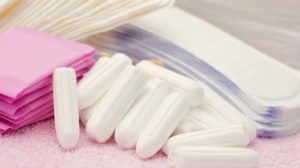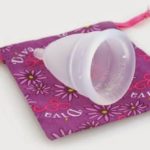A safer choice for feminine hygeine
Written by: Krystal Dinkel, RN

You might think this is a very weird conversation, but it’s time we had it anyway! I recently read an article reporting that cotton is the most heavily sprayed crop in the United States. According to the Organic Consumers Association, non-organic cotton is one of the most genetically engineered pesticide-and chemically-contaminated crops in the WORLD.
As I watch women my age come to the Riordan Clinic to begin their individual battles with cancer,  the avoidance of environmental toxins is a subject very dear to my heart. After reading up on the subject and also having several patients recently with ovarian and cervical cancer I started to think of the pesticides on our feminine products (i.e. cotton), not to mention the bleaching process and added fragrances, and wondering how much they contribute to these conditions given the fragile skin that we place them next to. To compound my concerns, as feminine hygiene products are considered “medical devices” manufacturers are not required to disclose their ingredients. This is so scary considering that we can absorb up to 70% of what we place on our skin!
the avoidance of environmental toxins is a subject very dear to my heart. After reading up on the subject and also having several patients recently with ovarian and cervical cancer I started to think of the pesticides on our feminine products (i.e. cotton), not to mention the bleaching process and added fragrances, and wondering how much they contribute to these conditions given the fragile skin that we place them next to. To compound my concerns, as feminine hygiene products are considered “medical devices” manufacturers are not required to disclose their ingredients. This is so scary considering that we can absorb up to 70% of what we place on our skin!

The good news is…there is a better way! The Sckoon cup and the Diva Cup are both made of healthcare grade silicone. They contain no chemicals, and there is no plastic waste. Don’t let their appearance intimidate you! Here’s my take on the Sckoon cup as someone that just made the jump in the past couple of months; the Sckoon cup is inserted folded over and creates a gentle suction around the cervix when it expands, similar to a diaphragm. It is very soft and flexible. There is no friction, poking or discomfort, and quite frankly it’s easy to forget it’s even there. It can be worn for a full 12 hours. It is extremely easy to break the suction, can be emptied, rinsed and reused immediately (may be cleaned with an alcohol saturated cotton ball for deeper cleaning) for UP TO 2 YEARS! Just imagine the cost savings! Even better news…contrary to what you might be thinking, there was actually less mess than with traditional regimens for managing your monthly cycle.
In my opinion this is an all-around win. You get the avoidance of pesticides, elimination  of plastic waste, cost savings and convenience/less mess in one product. It is such a simple thing that you can do to improve your journey to health and wellness! So, even if you’re already using one, it’s time to make this subject less taboo! Share the knowledge!
of plastic waste, cost savings and convenience/less mess in one product. It is such a simple thing that you can do to improve your journey to health and wellness! So, even if you’re already using one, it’s time to make this subject less taboo! Share the knowledge!
divacup.com
sckoon.com
UPDATE June 21, 2018:
Krystal, one of our very skilled nurses who wrote the above article, had a few thoughts to contribute regarding a recent article claiming that the menstrual cups may be harmful to your health due to bacteria. Here are her words:
“As with all of these products I think hygiene is the most important thing to stress. Washing your hands before and after, cleaning the cup between use and especially at the end of your cycle before storing it, I use alcohol as per the manufacturer recommendations, and of course not using it longer than the recommended 12 hour maximum. I never read how long it took for bacterial growth to be noted in the article you sent, but any product used in that environment for an extended period of time is asking for an infection.”
If you have more questions, please email us at information@riordanclinic.org, we’re happy to help!





